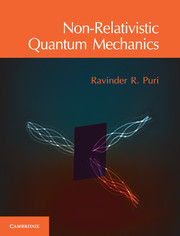Book contents
- Frontmatter
- Dedication
- Contents
- Preface
- 1 History of Quantum Mechanics
- 2 Vectors and Operators
- 3 Finite Dimensional Spaces
- 4 Function Space
- 5 Postulates of Quantum Mechanics
- 6 Density Operator
- 7 Measurement Postulate and Paradoxes of Quantum Mechanics
- 8 Position and Momentum Representations
- 9 Schrödinger Equation in One Dimension
- 10 One-Dimensional Piecewise Constant Potentials
- 11 One-Dimensional Exactly Solvable Continuous Potentials
- 12 Partially and Completely Periodic Potentials
- 13 Harmonic Oscillator
- 14 Three-Dimensional Central Potentials
- 15 Symmetry in Quantum Mechanics
- 16 Quantum Theory of Angular Momentum
- 17 Approximation Methods
- 18 Entanglement and Local Hidden Variable Theory
- Appendices
- References
- Bibliography
- Index
5 - Postulates of Quantum Mechanics
Published online by Cambridge University Press: 16 July 2025
- Frontmatter
- Dedication
- Contents
- Preface
- 1 History of Quantum Mechanics
- 2 Vectors and Operators
- 3 Finite Dimensional Spaces
- 4 Function Space
- 5 Postulates of Quantum Mechanics
- 6 Density Operator
- 7 Measurement Postulate and Paradoxes of Quantum Mechanics
- 8 Position and Momentum Representations
- 9 Schrödinger Equation in One Dimension
- 10 One-Dimensional Piecewise Constant Potentials
- 11 One-Dimensional Exactly Solvable Continuous Potentials
- 12 Partially and Completely Periodic Potentials
- 13 Harmonic Oscillator
- 14 Three-Dimensional Central Potentials
- 15 Symmetry in Quantum Mechanics
- 16 Quantum Theory of Angular Momentum
- 17 Approximation Methods
- 18 Entanglement and Local Hidden Variable Theory
- Appendices
- References
- Bibliography
- Index
Summary
This chapter builds the formal structure of quantum mechanics on the basis of five postulates. These postulates unify and formalize the concepts of matrix and wave mechanics introduced in Chapter 1. The first three postulates provide the framework for mathematical modelling of isolated systems and observables. The fourth postulate establishes relationship between theoretical description and experimental observations. Describing time evolution of a system is the content of the fifth postulate. The formalism is then extended to describe a composite system in terms of its constituent subsystems.
The formalism for describing a subsystem of a composite system, leading to the concept of density operator, is developed in Chapter 6.
Postulate 1: On Representing an Isolated System
An isolated system is described by a vector in the Hilbert space. The vectors differing only by a multiplying constant represent the same physical state.
A vector representing the state of a system is also referred to as a state vector. The implications of this postulate are
• The concept of the Hilbert space has been introduced in Chapter 2. Following the notation therein, the state of an isolated system according to the postulate in question is represented by a ket . A particular state is characterized by a label inside the ket. Thus, stands for a particular state of a given system.
Information
- Type
- Chapter
- Information
- Non-Relativistic Quantum Mechanics , pp. 99 - 124Publisher: Cambridge University PressPrint publication year: 2017
